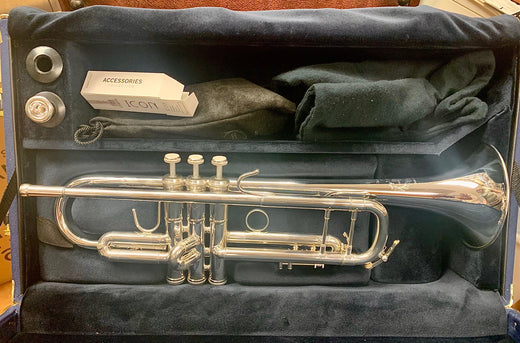Music Music Music

Performance Level Instruments Now Available At ...
Professional, performance-level brass and woodwind instruments are now available at Golden Music. Your previous rental credits with can be applied towards an upgrade to one of these fine instruments by...
Performance Level Instruments Now Available At ...
Professional, performance-level brass and woodwind instruments are now available at Golden Music. Your previous rental credits with can be applied towards an upgrade to one of these fine instruments by...
June Master Sale - Featured Violin - Francois B...
Francois Breton - France - 1778-1830 Francois Breton was a violin maker who did most of his work between 1778-1830 in Mirecourt, France. He was the personal luthier to the...
June Master Sale - Featured Violin - Francois B...
Francois Breton - France - 1778-1830 Francois Breton was a violin maker who did most of his work between 1778-1830 in Mirecourt, France. He was the personal luthier to the...
June Master Sale - Featured Violin - Ernest Mumby
Ernest Mumby - British Maker - 1888-1929 This is the Ernest Mumby Violin. He was born in 1888. He worked in Tottenham, North London, United Kingdom. He was a pupil...
June Master Sale - Featured Violin - Ernest Mumby
Ernest Mumby - British Maker - 1888-1929 This is the Ernest Mumby Violin. He was born in 1888. He worked in Tottenham, North London, United Kingdom. He was a pupil...
Scottish Fiddling Comes to Golden Music in Lake...
This Sunday we welcome Although she is the Juice O' the Barley's fiddler extraordinaire, Kelly also performs music in other genres--and quite well. Website SepiaChord.com described her as the "secret...
Scottish Fiddling Comes to Golden Music in Lake...
This Sunday we welcome Although she is the Juice O' the Barley's fiddler extraordinaire, Kelly also performs music in other genres--and quite well. Website SepiaChord.com described her as the "secret...
Gregory Walker Guest Conductor works with our C...
Since his 2009 Philadelphia Orchestra debut, praised by the American Record Guide as a performance of “precision and rapturous immediacy,” Gregory Walker has gained international recognition for his "beautifully calibrated...
Gregory Walker Guest Conductor works with our C...
Since his 2009 Philadelphia Orchestra debut, praised by the American Record Guide as a performance of “precision and rapturous immediacy,” Gregory Walker has gained international recognition for his "beautifully calibrated...
Announcing our new Guitar Teacher - AMAZING!!! ...
Pete Pigeon - Guitar Songwriting Didgeridoo Pete recently moved here from the East coast where he taught private lessons for 19 years. He has developed a customized approach to help...
Announcing our new Guitar Teacher - AMAZING!!! ...
Pete Pigeon - Guitar Songwriting Didgeridoo Pete recently moved here from the East coast where he taught private lessons for 19 years. He has developed a customized approach to help...
